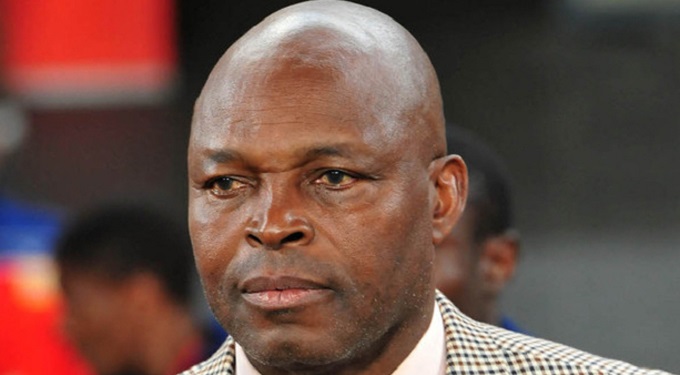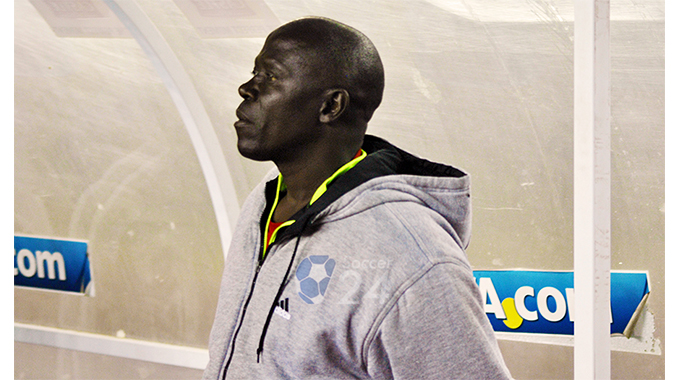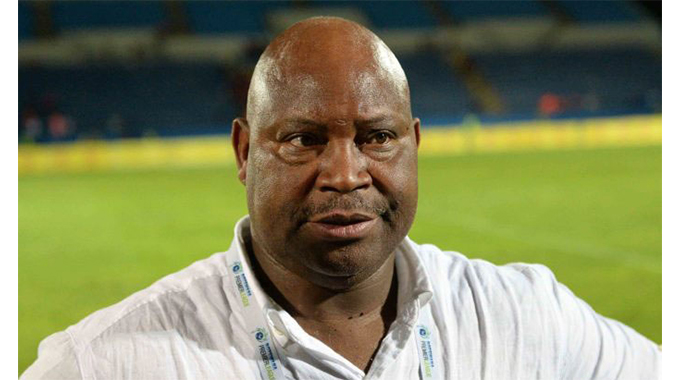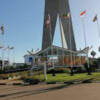
The Sunday News

Yesteryear greats with Lovemore Dube
FOOTBALL legend Charles Sibanda has described his first national team as Zimbabwe celebrated its first Independence Day as the highlight of his career.
“History will have it forever that I was part of the first national team,” said Sibanda last Friday from his farm 40km out of the capital Harare.
To add gloss to the call-up, Sibanda, Sunday Chidzambwa and Ephraim Moloi were top of the list for the captain’s band.
In the days leading to the first-ever international football matches after the war, national team coach Johnn Rugg, had earmarked the quartet for the skipper’s role. He had identified good leadership qualities in the four defenders who had shone for their respective clubs.
“It was adding gloss to my being named in the first-ever national team to be considered for the captaincy. There were great players in the side, very talented and leaders as well and there I was my name being touted for that role. On its own, the call-up is something that I have always cherished that my name will stay in the history books,” said Sibanda.
Chidzambwa, the country’s most decorated football personality, was eventually made captain of the team that won the four-nation tournament. Sibanda said at that time competition was stiff for places. He said national selectors must have had a torrid time coming up with the final team as among centre-backs, Rugg and his assistants were spoilt for choice.
“There was Graham Boyle, Sunday Chidzambwa, Shadreck Ngwenya, Stephen Chuma, Amos Rendo, Douglas Mloyi, Ephraim Moloi, Majid Dhana, Ephert Lungu all capable players who deserved to play for the national team,” said the former Caps United defence stalwart.

Sunday Chidzambwa
To be considered for the pioneering Warriors, Sibanda was outstanding for new kids on the block Caps Rovers as they were known back then. The club had won a highly contested Chibuku Trophy final against Zimbabwe Saints and the national league play-off in 1979.
Despite the quartet of Joel Shambo, Stix M’tizwa, Shaky Tauro and Stanley Ndunduma hogging the limelight, as forwards and linkmen, Sibanda’s towering influence in defence could not be ignored. He was the pillar that goalkeeper Stephen Chisango and the club could count on both bad and good days on the field.
The 1979 breakthrough by Caps heralded a new chapter in Zimbabwe football as a football giant was born, and stars unearthed for a generation to follow. For almost a decade starts from the 1979 Caps Rovers side, stood tall among the best in the land, dominating national team call-ups, Soccer Star of the Year calendar and top goalscorers’ charts.

Stix M’tizwa
Sibanda had arrived at Caps in 1978 from Hippo Valley FC where he had played under Mick Poole. Caps were then under Obadiah Sarupinda and Lovemore Nyabeze. At the start of the championship winning season, Ashton Nyazika arrived at the club as package with his former Glen Strikers stars Stix M’tizwa, Size Torindo and William Chikauro.
Dickson Ngwenya, Ndunduma and Shambo came from lower division side Coca-Cola, mixing youth and experienced stars, the coaching trio of Nyazika, Nyabeze and Sarupinda were able to mould an untouchable cup dominating side.
“It was a great mixture of young and budding talent and experienced lads and we were motivated by incentives from the company,” said Sibanda.
Caps dominated the Zimbabwe FA Cup (Zifa/Castle Cup) and earned the Cup Kings title. They were displaced by Barry Daka’s Highlanders FC in 1986. He explained why the side did so well with such a galaxy of stars but failed in the league championship race.
“The league race is a marathon. Consistency is key. We excelled in cup games because of the incentive structure where the winners’ cheque was cashed the next Monday and players given all of it. We were well taken care of and it did not come as a surprise that we stayed together as a unit for so long.
No one ever thought of leaving and a majority of the Caps players were driving cars. They were able to buy houses and lead decent lives from football as the company employed a majority of us,” said Sibanda.
It was sad to see stars like Tauro, Shambo, Friday Phiri, Sibanda, Chisango, Kainos Chindungwe, Tobias Moyo, Duncan Ellison and Solomon Kaseke all bowing out of the field without a league medal for all their brilliance. Sibanda conceded that he played his best football at Caps where he had started off as a left-back. Among some of the players he played with were David Gwanzura, William Chikauro, Elisha Gejo, Itai Tambala, Charlie Jones and Salad Twaliki.
With Caps United dominating the FA Cup, which went with a ticket to Africa, Sibanda was able to travel the length and width of Africa in the Cup Winners Cup tournament which letter changed to the Caf Confederations Cup. He mourns a lost opportunity to play outside the country.

“We played Arab Contractors in 1981 and Stix, Ndunduma and myself impressed the Arabs. They wanted to sign us and the club blocked our moves arguing that they needed us here and that we were still developing. It was a lost opportunity for us as individuals and also for the country, we would have benefited from their game which was already a mile’s length ahead of us. We lost a lot because of our suspension from world football,” said Sibanda.
Sibanda counts his match against Cameroon in 1981 as one of his best. Zimbabwe bowed out of the World Cup qualifiers by a single goal. He blames it on lack of international exposure.
“Our tactics tended to be different from the rest of the competitive Africa. The countries we played tried as much as they could not to concede a goal at home and knew what to do in the reverse fixture, whereas we wanted to win at home and paid no attention not to concede. Always we were close but would be eliminated by just a goal,” said Sibanda, a qualified Caf B licence holder who has coached Air Zimbabwe Jets, Archer Stars, Eagles, Circle Cement, Jumbo Giants, Arcadia and Turnall.
Sibanda retired from the game at the age of 32 in 1987 after a long battle with a groin injury. He would coach several local clubs and later the Zimbabwe Under-17 side. Of his generation Sibanda says Robert Godoka of Rio Tinto and Zimbabwe Saints’ Andrew Kadengu were his worst nightmare before Independence.
“Then in the generation that followed Godoka and Kadengu, I must say Madinda Ndlovu and Boy Ndlovu were two players whom we had to prepare for. They were a thorn in the flesh with their pace and dribbling,” said Sibanda.

Madinda Ndlovu
He speaks fondly of his time at Eagles.
“That was a typical side of talent brewed in the streets and youth clubs. If only one could take them as a whole to Caps United who had better funding, the country would have seen something else. I enjoyed working with Majuta, a great player I had played against and was now with Boy Ndlovu, Simon Ncube, Joseph Ndlovu, Felix Ntuthu, Johannes Tshuma, Stoneshead Moyo, Victor Moonsammy and Francis Paketh, what a talented lot they were,” said Sibanda.
Sibanda, a father of eight children, seven boys and one girl, was born on 6 April in 1955. He started kicking the ball at the age of five. At 10 years he debuted in his school team’s second side under the guidance of legendary Allan Hlatshwayo who made his mark as a player at Arcadia and also as a sports journalist after he quit teaching at Mbare’s Nharira Primary School.
Sibanda who at one time was regional manager for Caps Holdings in Bulawayo, played as a left winger for the senior team at 13. Like most youngsters of his era, most of his time was spent at the Boys’ Club at Stodart Hall where he played from Under-12 up to 16. He later joined Castle Lions Under-16s who were coached by Daniel Chikanda who captained the first team.
He played with the likes of Robert Mudzimu, Gozzie Galloway and Bernard Dzingai who starred for Black Aces. In the inter-townships games, Sibanda played for Dindingwe against Highfields and Mabvuku while he represented Mbare.
At 17, Poole signed him up for Castle Lions who would later combine with Bulawayo Sables to form Salisbury Sables winners of the 1972 league championship.
“We had James Nxumalo, Danger Nyathi and John Dube joining us from Bulawayo Sables. Castle Lions had Simon Supiya, Stanley Nyika, Wilfred ‘Tap Tap’ Emmanuel, Daniel Muiyambo, Paul Tsumbe, James Machaka and Chikanda. It was a great time that gelled together well and hence the good results,” said Sibanda who was nicknamed Raw Meat.
In 1976 Sibanda found himself playing outside the capital after being wooed by Poole to Hippo Valley where he stayed until 1978 when at 23 he moved to Caps Rovers. The move would turn his career around leaving him to retire with countless medals and the honour of being in the 1980 national team.
Forty two years down the line, Sibanda believes standards of the game have gone down because of wrong people in positions. He also attributes that to lack of development structures.
Sibanda says our game rushed into getting players to play full time without requisite sponsorship for the clubs hence even the biggest teams Caps United, Dynamos and Highlanders are struggling despite massive fan support. He was nicknamed Raw Meat because he was a no-nonsense defender who was hard but fair on the tackle whose other attributes were pace and height.




